Fuel Tank Replacement TrailBlazer, Envoy, Bravada
Removal Procedure
- Relieve the fuel system pressure. Refer to the Fuel Pressure Relief .
- Raise the vehicle. Refer to Lifting and Jacking the Vehicle in General Information.
- Remove the frame brace. Refer to Frame Brace Replacement in Frame and Underbody.
- Remove the fuel tank shield, if equipped. Refer to Fuel Tank Shield Replacement in Frame and Underbody.
- Drain the fuel tank. Refer to Fuel Tank Draining .
- Disconnect the fuel tank pressure sensor electrical connector (3).
- Disconnect the evaporative emission (EVAP) vent valve electrical connector (2).
- Disconnect the EVAP vapor pipe (4) from the EVAP canister (3).
- Disconnect the EVAP vent valve pipe (2) from the EVAP canister (3).
- Disconnect the fuel return pipe and the fuel feed pipe (1). Refer to Plastic Collar Quick Connect Fitting Service .
- Cap the fuel and EVAP pipes in order to prevent possible fuel system contamination.
- With the aid of an assistant, support the fuel tank.
- Remove the fuel tank strap attaching bolts.
- Remove the fuel tank straps.
- Carefully lower the fuel tank.
- Disconnect the fuel sender electrical connector.
- Remove the fuel tank.
- Place the fuel tank in a suitable work area.
- If the fuel tank is not being replaced, go to the Installation Procedure.
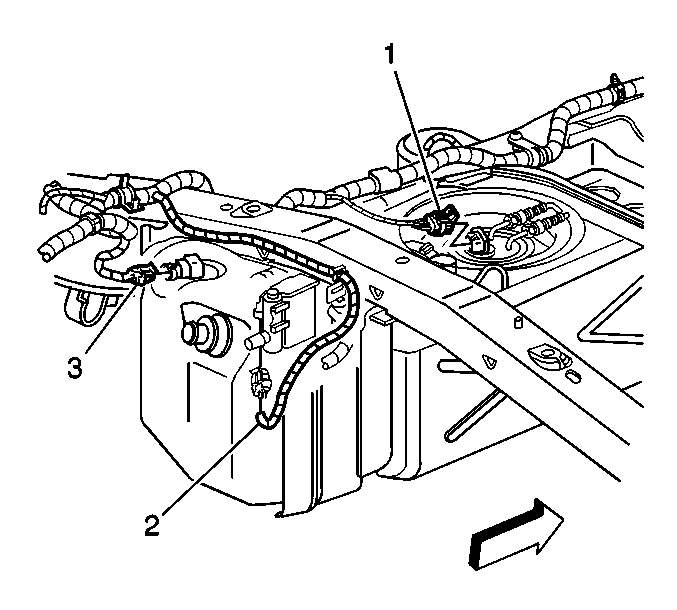
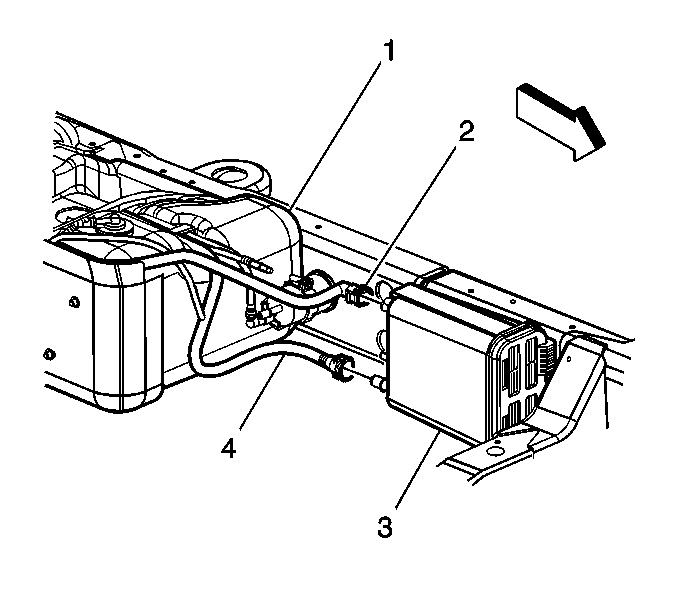
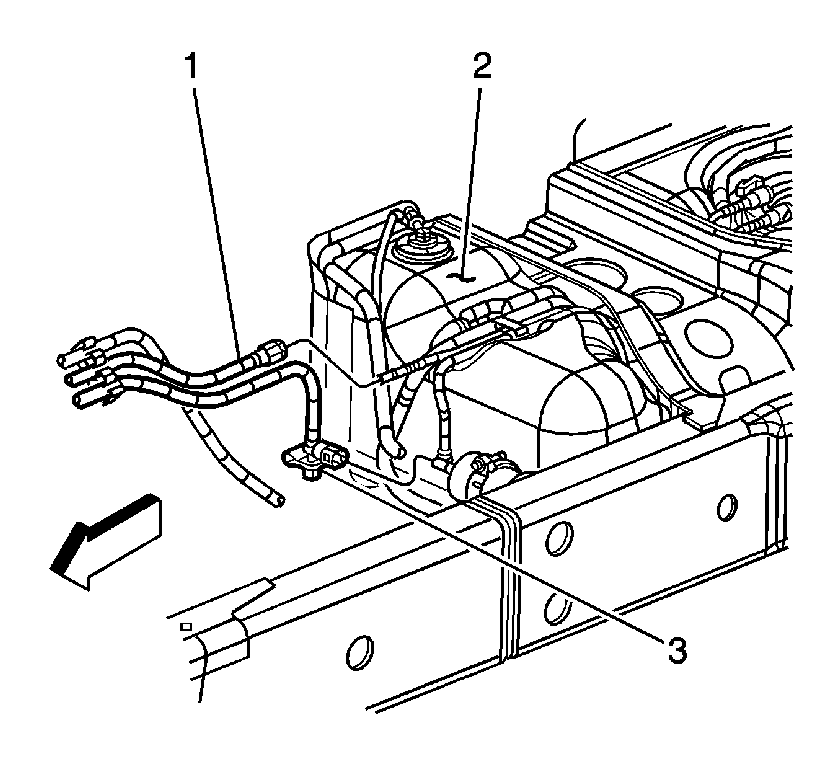
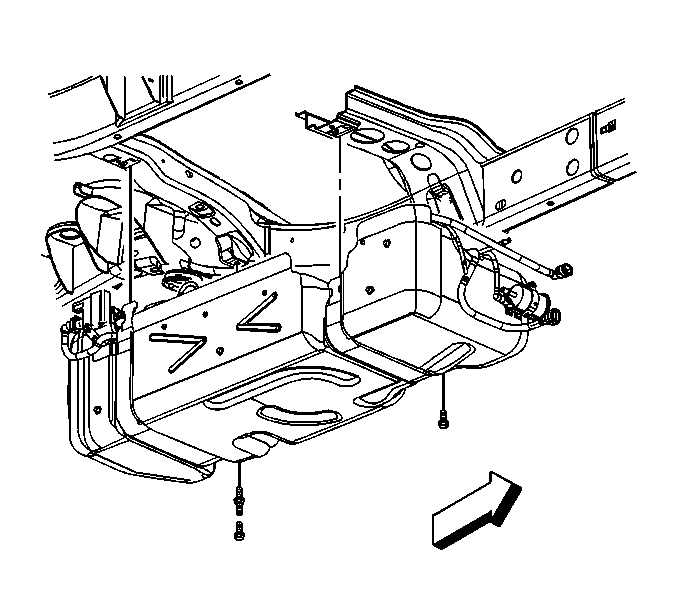
Notice: Do not bend the fuel tank straps. Bending the fuel tank straps may damage the straps.
Disassembly Procedure
- Remove the EVAP vent valve (1). Refer to Evaporative Emission Canister Vent Solenoid Valve Replacement .
- Remove the fuel filter (7). Refer to Fuel Filter Replacement .
- Disconnect the fuel feed and return pipes from the fuel sender (4). Refer to Plastic Collar Quick Connect Fitting Service .
- Remove the fuel feed and return pipes from the retaining clip (6).
- Remove the EVAP vent valve pipe.
- Disconnect the EVAP vapor pipe from the fill limiter vent valve (3), and the front and rear rollover valves (2, 5).
- Remove the EVAP vapor pipes.
- Remove the fuel sender assembly (4) from the fuel tank. Refer to Fuel Sender Assembly Replacement .
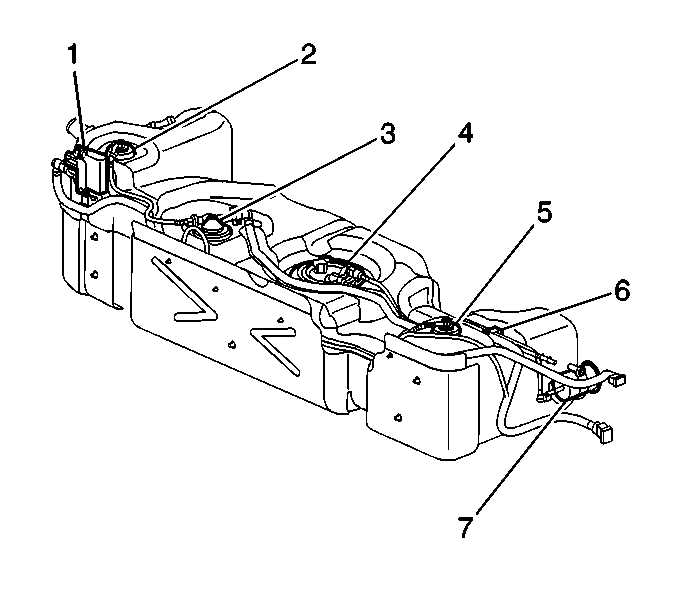
Assembly Procedure
- Install the fuel sender assembly (4) to the fuel tank. Refer to Fuel Sender Assembly Replacement .
- Connect the EVAP vapor pipe to the fill limiter vent valve (3) and the front and rear rollover valve (2, 5). Refer to Plastic Collar Quick Connect Fitting Service .
- Install the EVAP vent valve pipe.
- Connect the fuel feed and return pipes to the fuel sender (4). Refer to Plastic Collar Quick Connect Fitting Service .
- Install the fuel feed and return pipes to the retaining clip (6).
- Install the fuel filter (7). Refer to Fuel Filter Replacement .
- Install the EVAP vent valve (1). Refer to Evaporative Emission Canister Vent Solenoid Valve Replacement .

Installation Procedure
- With the aid of an assistant, position and support the fuel tank.
- Connect the fuel sender electrical connector.
- Install the fuel tank straps.
- Install the fuel tank strap attaching bolts.
- Remove the caps from the fuel and EVAP pipes.
- Connect the fuel return pipe and the fuel feed pipe (1). Refer to Plastic Collar Quick Connect Fitting Service .
- Connect the EVAP vent valve pipe (2) to the EVAP canister (3).
- Connect the EVAP vapor pipe (4) to the EVAP canister (3).
- Connect the fuel pressure sensor electrical connector (3).
- Connect the EVAP vent valve electrical connector (2).
- Connect the fuel fill hose (2) to the fuel tank.
- Lower the vehicle.
- Refill the fuel tank.
- Install the fuel filler cap.
- Connect the negative battery cable. Refer to Battery Negative Cable Disconnection and Connection in Engine Electrical.
- Raise the vehicle. Refer to Lifting and Jacking the Vehicle in General Information.
- Inspect for leaks.
- Install the fuel tank shield, if equipped. Refer to Fuel Tank Shield Replacement in Frame and Underbody.
- Install the frame brace. Refer to Frame Brace Replacement in Frame and Underbody.
- Lower the vehicle.

Notice: Use the correct fastener in the correct location. Replacement fasteners must be the correct part number for that application. Fasteners requiring replacement or fasteners requiring the use of thread locking compound or sealant are identified in the service procedure. Do not use paints, lubricants, or corrosion inhibitors on fasteners or fastener joint surfaces unless specified. These coatings affect fastener torque and joint clamping force and may damage the fastener. Use the correct tightening sequence and specifications when installing fasteners in order to avoid damage to parts and systems.
Tighten
Tighten the bolts to 32 N·m (24 lb
ft).



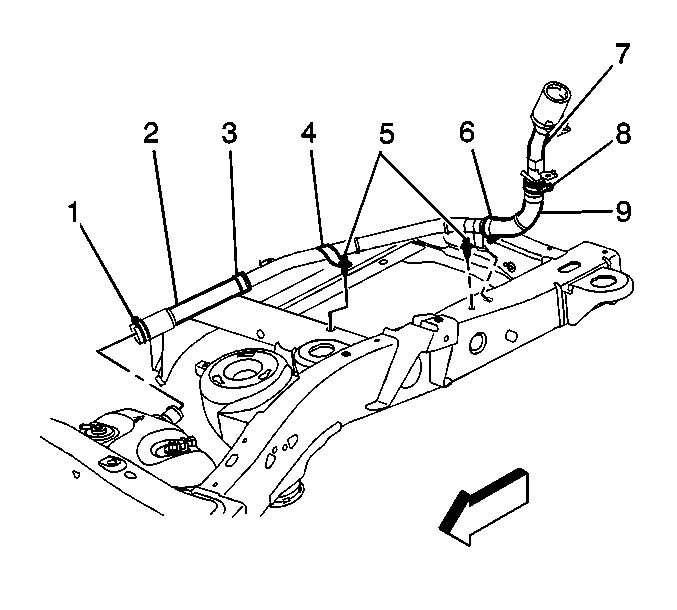
Tighten
Tighten the fuel fill hose clamp (1) to 2.5 N·m
(22 lb in).
| 17.1. | Turn ON the ignition, with the engine OFF for 10 seconds. |
| 17.2. | Turn OFF the ignition for 10 seconds. |
| 17.3. | Turn ON the ignition, with the engine OFF. |
| 17.4. | Inspect for fuel leaks. |
Fuel Tank Replacement TrailBlazer EXT, Envoy XL
Removal Procedure
- Relieve the fuel system pressure. Refer to the Fuel Pressure Relief .
- Raise the vehicle. Refer to Lifting and Jacking the Vehicle in General Information.
- Remove the frame brace. Refer to Frame Brace Replacement in Frame and Underbody.
- Remove the fuel tank shield, if equipped. Refer to Fuel Tank Shield Replacement in Frame and Underbody.
- Drain the fuel tank. Refer to Fuel Tank Draining .
- Disconnect the fuel tank pressure sensor electrical connector (3).
- Disconnect the evaporative emission (EVAP) vent valve electrical connector (2).
- Disconnect the fuel return pipe, the fuel feed pipe and the EVAP purge pipe (1). Refer to Plastic Collar Quick Connect Fitting Service .
- Cap the fuel and EVAP pipes in order to prevent possible fuel system contamination.
- With the aid of an assistant, support the fuel tank.
- Remove the fuel tank strap attaching bolts (1).
- Remove the fuel tank straps (2).
- Carefully lower the fuel tank.
- Disconnect the fuel sender electrical connector (1).
- Remove the fuel tank.
- Place the fuel tank in a suitable work area.
- If the fuel tank is not being replaced, go to the Installation Procedure.
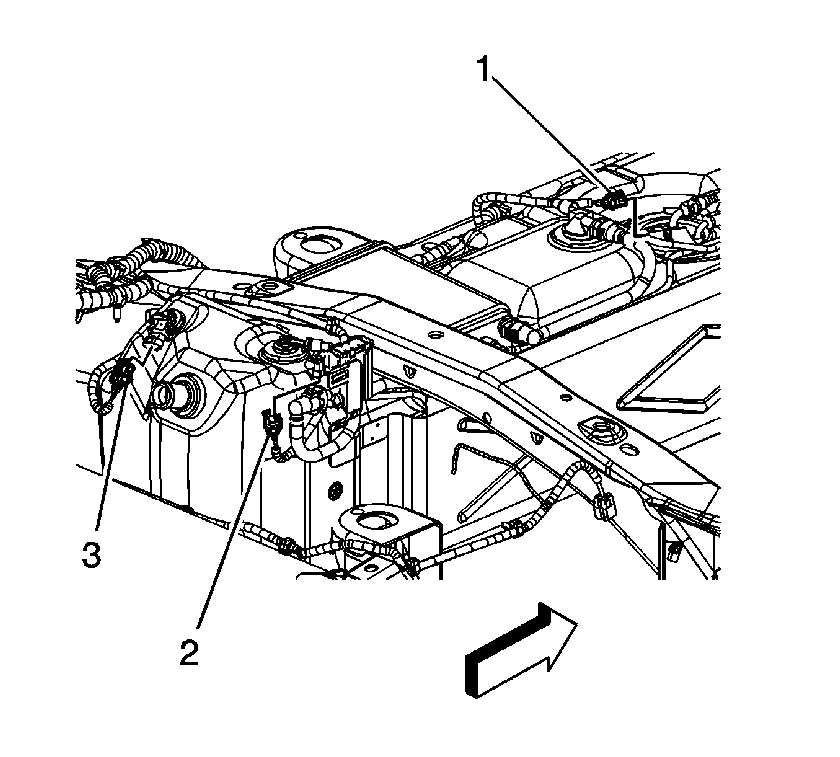
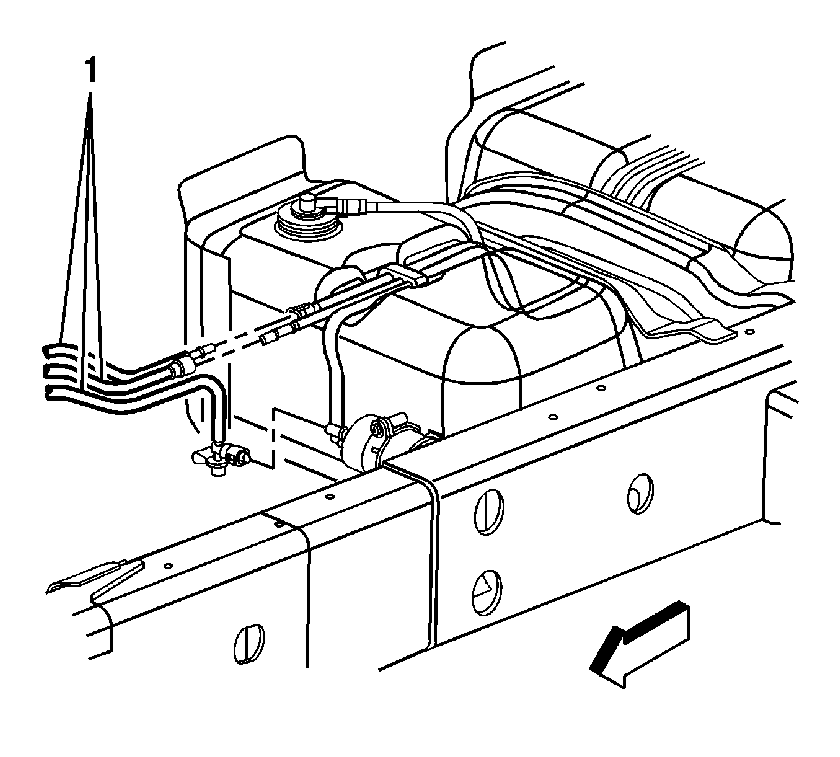
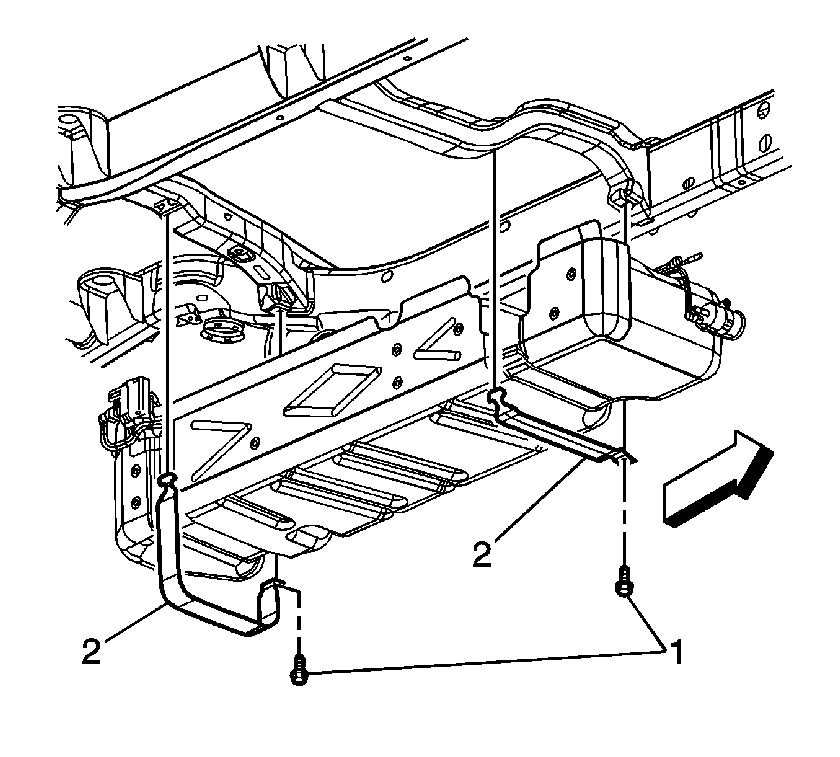
Notice: Do not bend the fuel tank straps. Bending the fuel tank straps may damage the straps.

Disassembly Procedure
- Remove the EVAP vent valve (1). Refer to Evaporative Emission Canister Vent Solenoid Valve Replacement .
- Remove the fuel filter (8). Refer to Fuel Filter Replacement .
- Disconnect the fuel feed and return pipes from the fuel sender (5). Refer to Plastic Collar Quick Connect Fitting Service .
- Remove the fuel feed and return pipes from the retaining clip (7).
- Remove the EVAP vent valve pipe.
- Disconnect the EVAP vapor pipe from the fill limiter vent valve (4), and the front and rear rollover valves (2, 6).
- Remove the EVAP vapor pipes.
- Remove the fuel sender assembly (5) from the fuel tank. Refer to Fuel Sender Assembly Replacement .
- Remove the EVAP canister (3) Refer to Evaporative Emission Canister Replacement .
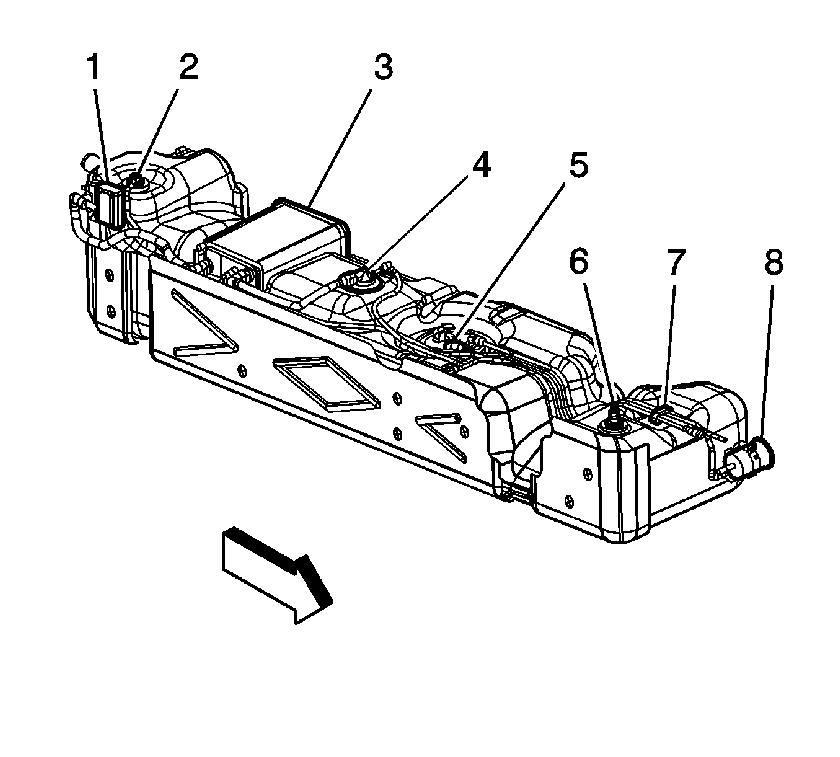
Assembly Procedure
- Install the EVAP canister (3) Refer to Evaporative Emission Canister Replacement .
- Install the fuel sender assembly (5) to the fuel tank. Refer to Fuel Sender Assembly Replacement .
- Connect the EVAP vapor pipe to the fill limiter vent valve (4) and the front and rear rollover valve (2, 6). Refer to Plastic Collar Quick Connect Fitting Service .
- Install the EVAP vent valve pipe.
- Connect the fuel feed and return pipes to the fuel sender (5). Refer to Plastic Collar Quick Connect Fitting Service .
- Install the fuel feed and return pipes to the retaining clip (7).
- Install the fuel filter (8). Refer to Fuel Filter Replacement .
- Install the EVAP vent valve (1). Refer to Evaporative Emission Canister Vent Solenoid Valve Replacement .

Installation Procedure
- With the aid of an assistant, position and support the fuel tank.
- Connect the fuel sender electrical connector (1).
- Install the fuel tank straps (2).
- Install the fuel tank strap attaching bolts (1).
- Remove the caps from the fuel and EVAP pipes.
- Connect the fuel return pipe, the fuel feed pipe and the EVAP purge pipe (1). Refer to Plastic Collar Quick Connect Fitting Service .
- Connect the fuel tank pressure sensor electrical connector (3).
- Connect the EVAP vent valve electrical connector (2).
- Connect the fuel fill hose (2) to the fuel tank.
- Lower the vehicle.
- Refill the fuel tank.
- Install the fuel filler cap.
- Connect the negative battery cable. Refer to Battery Negative Cable Disconnection and Connection in Engine Electrical.
- Raise the vehicle. Refer to Lifting and Jacking the Vehicle in General Information.
- Inspect for leaks.
- Install the fuel tank shield, if equipped. Refer to Fuel Tank Shield Replacement in Frame and Underbody.
- Install the frame brace. Refer to Frame Brace Replacement in Frame and Underbody.
- Lower the vehicle.


Notice: Use the correct fastener in the correct location. Replacement fasteners must be the correct part number for that application. Fasteners requiring replacement or fasteners requiring the use of thread locking compound or sealant are identified in the service procedure. Do not use paints, lubricants, or corrosion inhibitors on fasteners or fastener joint surfaces unless specified. These coatings affect fastener torque and joint clamping force and may damage the fastener. Use the correct tightening sequence and specifications when installing fasteners in order to avoid damage to parts and systems.
Tighten
Tighten the bolts to 32 N·m (24 lb
ft).



Tighten
Tighten the fuel fill hose clamp (1) to 2.5 N·m
(22 lb in).
| 15.1. | Turn ON the ignition, with the engine OFF for 10 seconds. |
| 15.2. | Turn OFF the ignition for 10 seconds. |
| 15.3. | Turn ON the ignition, with the engine OFF. |
| 15.4. | Inspect for fuel leaks. |
